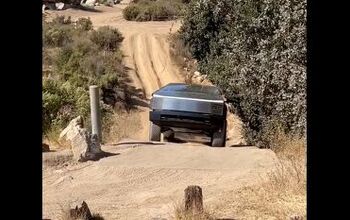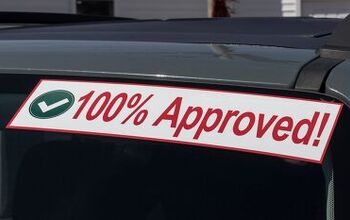Volkswagen's Diesel Fix Has European Customers Wishing They Hadn't Bothered

Volkswagen’s U.S. diesel woes have consumed most of the oxygen in the room for the past year and a half, but Europe has its own issues with the automaker’s emissions-spewing powerplants.
While owners on the continent haven’t had to hand their vehicle over in exchange for cash, the region’s less-stringent environmental laws still require that VW offer a fix for its rigged diesel engines. Good news for air quality, but bad news — apparently — for drivers. Many owners have discovered the fix turns a perfectly fine (though illegal) vehicle into a nightmare.
According to UK’s The Guardian, complaints are pouring in over the newly compliant 1.6 and 2.0-liter diesel four-cylinders.
A total of 1.2 million VW, Skoda and Seat vehicles are currently under recall, of which half a million have seen a fix. Some just require a software upgrade, which happens to be the only available fix for certain newer-model U.S. vehicles, but a more in-depth fix for other vehicles has proved to be a problem. The U.S. hasn’t approved a full-scale fix for older affected vehicles, but it remains on the option list for VW owners facing a buyback.
2015 model year vehicles equipped with the 2.0-liter diesel will ultimately see the installation of a diesel particulate filter, diesel oxidation catalyst and NOx catalyst, in addition to the software tweaks. In Europe, however, a “flow transformer” mesh insert installed in the air intake allows the car’s computer to gain a more accurate reading of incoming oxygen.
The newspaper claims the alterations performed on 1.6-liter engines have turned vehicles into “a shadow of their former selves.” Some of the grips stem from the fact that the recall’s voluntary nature wasn’t known to some owners, or that the fix was performed during routine servicing.
One Guardian reader, James Harrison, said his 2010 Golf 1.6 “has begun to stall intermittently, and is difficult to restart.” The vehicle now goes into regeneration mode — a process where the particulate trapped by the filter is burned off at high temperatures — every day, rather than a few times a year, he claims.
“If the car is regenerating every day, what will this do to the lifespan of the EGR [exhaust gas recirculation] valve and the rest of the exhaust system, which cost thousands to fix if they go wrong?” Harrison wrote, adding that the fix has “ruined” his car.
Volkswagen admits there are some complaints about the fix, but denies that it’s a widespread issue.
Last fall, the British automotive website Honest John detailed some of the complaints that began rolling in regarding 2.0-liter Tiguans. Fixed vehicles often exhibit a decrease in low-end torque, accompanied by an annoying rattle, the publication said. One owner said a VW mechanic confirmed their 2012 Tiguan lacked power between 1,000 and 2,000 rpm. Another claimed their 2012 2.0-liter Passat wagon was a “sluggish, underpowered donkey.” Another poster’s fuel economy dropped by up to 10 percent.
One Honest John poster, claiming to be a former VW mechanic, advised readers to have a specialist reverse their vehicle’s engine fix.
All of this seems like another headache in waiting for Volkswagen of America. While Volkswagen claims the approved fix for newer 2.0-liter engines will “not affect vehicle fuel economy, reliability, or durability,” Europe’s woes should make the automaker wary of repairing older models. So far, the buyback has proved very popular in the States. If the EPA fails to approve an older engine fix, it might not be a loss to either VW or owners.

More by Steph Willems
Latest Car Reviews
Read moreLatest Product Reviews
Read moreRecent Comments
- Kjhkjlhkjhkljh kljhjkhjklhkjh A prelude is a bad idea. There is already Acura with all the weird sport trims. This will not make back it's R&D money.
- Analoggrotto I don't see a red car here, how blazing stupid are you people?
- Redapple2 Love the wheels
- Redapple2 Good luck to them. They used to make great cars. 510. 240Z, Sentra SE-R. Maxima. Frontier.
- Joe65688619 Under Ghosn they went through the same short-term bottom-line thinking that GM did in the 80s/90s, and they have not recovered say, to their heyday in the 50s and 60s in terms of market share and innovation. Poor design decisions (a CVT in their front-wheel drive "4-Door Sports Car", model overlap in a poorly performing segment (they never needed the Altima AND the Maxima...what they needed was one vehicle with different drivetrain, including hybrid, to compete with the Accord/Camry, and decontenting their vehicles: My 2012 QX56 (I know, not a Nissan, but the same holds for the Armada) had power rear windows in the cargo area that could vent, a glass hatch on the back door that could be opened separate from the whole liftgate (in such a tall vehicle, kinda essential if you have it in a garage and want to load the trunk without having to open the garage door to make room for the lift gate), a nice driver's side folding armrest, and a few other quality-of-life details absent from my 2018 QX80. In a competitive market this attention to detai is can be the differentiator that sell cars. Now they are caught in the middle of the market, competing more with Hyundai and Kia and selling discounted vehicles near the same price points, but losing money on them. They invested also invested a lot in niche platforms. The Leaf was one of the first full EVs, but never really evolved. They misjudged the market - luxury EVs are selling, small budget models not so much. Variable compression engines offering little in terms of real-world power or tech, let a lot of complexity that is leading to higher failure rates. Aside from the Z and GT-R (low volume models), not much forced induction (whether your a fan or not, look at what Honda did with the CR-V and Acura RDX - same chassis, slap a turbo on it, make it nicer inside, and now you can sell it as a semi-premium brand with higher markup). That said, I do believe they retain the technical and engineering capability to do far better. About time management realized they need to make smarter investments and understand their markets better.


































Comments
Join the conversation
I intended to buy one of these TDIs several times, but my trusted mechanic, a VW/audi enthusiast, always cautioned me away. Not like the older TDIs, he said. The engines were fine, but the emissions systems were so elaborate that they would give me trouble down the road. I wish I had bought one anyway and enjoyed VW's generous buyback offers. But I wonder how long with these components last when they're pressed into service much more often?
Widely predicted outcome. Now these poor owners are going to see a big drop in the resale value of their cars.